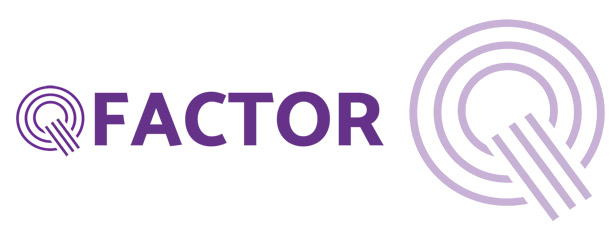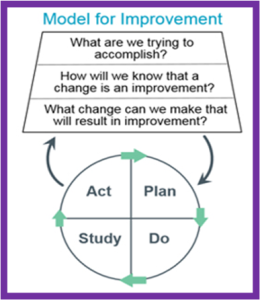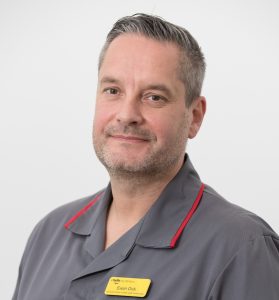Made possible thanks to a partnership between the Trust’s Clinical Audit and Guidelines Group, Quality Effectiveness Team, Newcastle Improvement and Newcastle Hospitals Charity, the Q Factor Awards highlight the excellent work taking place across in-hospital and community services including improvements in patient safety and experience.
This year’s Q Factor Winners Award recognised Newcastle’s pelvic health physiotherapy team for their commitment to improving the patient experience for people affected by overactive bladders using an innovative QI approach bestowing them with the Grand Prize of £1,000. Their initiative has been cited as “an exemplary example of quality improvement in action.”

Finalists were picked from a shortlist spanning a whole range of disciplines across the Trust, with the top applicants being invited to present their work to a panel of judges and Professor Sir John Burn, Chairman at Newcastle Hospitals, was on hand to give out the prizes and congratulate the winners.
Winning team
Pelvic health physiotherapists Emma Hargreaves, Orlaith Kilgannon and Suzanne Vernazza sought to improve their acupuncture clinic pathways working in collaboration with colleagues from Newcastle Improvement and the Institute of Health Improvement.
Their QI initiative has proved so effective that they have seen a 91% reduction in referral to treatment time as well as increased capacity in less than 12 months.
Long term condition
Overactive bladder is a common, long term condition that affects around 12% of the UK population. It is more prevalent in older people, women in particular with an estimated 21% of women over the age of 40 affected.
The International Continence Society defines overactive bladder as urinary urgency, frequency and having to get up in the night, frequently accompanied by urinary incontinence. Treatment is guided by NICE recommendations and first line treatment includes reviewing lifestyle and bladder health habits, pelvic floor exercises and can be combined with a trial of medication. More invasive treatments include botox injections into the bladder and neuro modulation and as a final resort in some cases, surgery may be offered.
Acupuncture is not currently part of NICE guidance despite a growing body of evidence supporting its use. The physiotherapy team at Newcastle’s RVI are actively involved in acupuncture for overactive bladder research.
Symptom management with acupuncture
Emma has used acupuncture to treat overactive bladder symptoms since 2014 and seen great success with many patients, helping them to maintain the management of their symptoms. However, as prevalence of the condition has increased over time and more people seek acupuncture as their preferred treatment of choice, demand overtook clinic availability.
Suzanne explains: “Capacity became a major issue. To crack this we needed to understand what the problem was, any barriers and how to overcome them. We decided we should start a quality improvement project and our journey started with learning about QI methodology to create driver diagrams. This helped us to identify our primary and secondary drivers for the project.”
The team enrolled in the Improvement programme for Teams run by the Institute for Healthcare Improvement and Newcastle Improvement and their Quality Improvement project began in May 2022.
Orlaith continues “We attended two workshops where we learnt about how to identify the problems we were experiencing and how to use the Model for Improvement approach with PDSA cycles and driver diagrams. This really helped us to put our ideas into action and measure changes along the way.”
The PDSA Model for Improvement

Drivers for change were identified and as capacity was the key issue, the team decided to build in new capacity by establishing a dedicated clinic out of the usual working hours.
Emma says “We set up a new multi-bed acupuncture clinic by working closely with our colleagues in the musculoskeletal team.
“This way we collectively identified a four bedded space where two physiotherapists could hold a weekly acupuncture clinic every Monday evening from 5:00 to 8:00pm. This would allow for up to four patients being treated at the same time with 12 appointments per clinic.”
To ensure the changes they made were working they developed satisfaction surveys for both patients and staff, documented how many clinic appointments were filled and attended and implemented a range of regular outcome measures to ensure efficacy and efficiency.
The referral criteria for the clinic was reviewed and formalised and data collected on referral to treatment waiting times, departmental waiting times, patient satisfaction and treatment outcomes on an ongoing basis.
To ensure success of the project Orliath says “To make all of this work we had to be really organised and plan ahead. We made sure we were both available when we needed to be and had strictly protected time so that we could regularly review the outcomes of everything we were doing, comparing what was actually happening against our drivers for change. This was really important and as it turns out, incredibly enlightening as the outcomes were not quite as we expected!”
Unexpected improvements
Initially the team was driven to increase availability of acupuncture appointments by 50% for patients by 1 October 2022 whilst maintaining patient centred care. However the results saw a significant reduction in referral to treatment time by 91% (from 95 days to 4 days) – superb outcomes.
Emma says “We discovered that by holding a new Monday evening clinic we had been able to massively reduce waiting times as well as increasing capacity. This was great news in terms of ensuring sustainability of the service in the long run and no other services were affected.
“Perhaps most importantly” adds Emma, “patient satisfaction and clinical outcomes remained positive.”
The team’s QI initiative has been described as an exemplary example of quality improvement in action, and shows that by using regular PDSA cycles, you can see whether or not your initial drivers are being met and where and when any modifications may need to be made.

Of the team’s win Ewan Dick, Associate Director of Allied Health Professionals and Therapy Services says “This is a great achievement for the pelvic health physio team. This project has the patient experience and quality at the heart of it and the improvement approach has helped achieve a sustainable and positive change with benefits across so many aspects of the service and patient pathway.
“The team never stands still – they have huge experience and expertise and continually look to evolve, develop and improve how they support their patients.
“I’m so pleased this was recognised with the Q-Factor award and I am sure will help further progress their improvement and research work.”
The team hasn’t finished yet. Emma says “We will continue to evaluate how the clinics go through the PDSA cycles to evaluate efficacy of treatment and long term sustainability of the service and we hope that the approach can be replicated for other clinics with similar capacity issues.”
Sarah Watson, an Improvement Facilitator with Newcastle Improvement says: “I’d like to congratulate the team for all their hard work. It has been an absolute pleasure working with them as their improvement coach to support them in reaching their goal.
“The project clearly demonstrates how taking a quality improvement approach and following the right methodology can improve a service and have positive impacts. This project not only has improved patient care but had a positive impact on the team and how they continue to progress the service they provide.”
Sarah adds “We’d encourage like-minded colleagues to find out more and explore our easy to follow, step-by-step approach, which has been developed to help staff make sustainable changes of any size on our Flourish website or contact us at [email protected]
Find out more
Newcastle Improvement is here to support you and your teams to lead changes (big and small) in your own areas. Our aim is to build a culture of continuous quality improvement, together.
You can find out more about our Newcastle Improvement Approach, Learning and Sharing Events, and how you can get advice, support, training and so much more on our Flourish website.
Flourish at Newcastle Hospitals – Continuous Quality Improvement
Or you can contact us by email [email protected]
